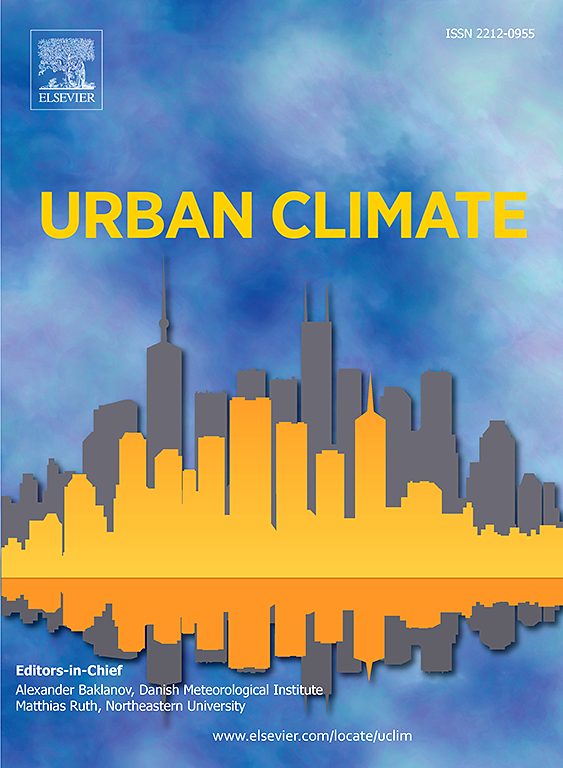城市热岛遥感研究:文献计量学综述,特别以印度为例
IF 6
2区 工程技术
Q1 ENVIRONMENTAL SCIENCES
引用次数: 0
摘要
气候变化是当今世界主要关注的问题之一,主要是由于全球城市地区的扩散。这就导致了城市热岛(UHI)效应,即城市核心的温度比非城市环境的温度高,并且已知会影响居民的生活。为了更好地了解这一现象,遥感已被证明是研究这一现象、其物理性质及其影响的宝贵工具。由于印度的城市化呈指数级增长,研究城市热岛效应并制定有针对性的缓解政策至关重要。本综述旨在通过广泛回顾利用遥感开展的关于城市热岛效应的研究,并随后比较印度与世界的研究状况,帮助研究人员、政策制定者和机构为未来的研究轨迹和政策制定提供知情决策,从而为研究人员、政策制定者和机构提供帮助。通过结合严格的纳入和排除标准,包括各种关键词、最高被引次数和过去15年(2009年至2023年)的出版年份范围,我们对576篇论文中的94篇进行了文献计量学趋势、技术规范和方法的仔细审查。这些文件还包括拟议的缓解战略(如果有的话)的范围。报告发现,2015年《巴黎协定》签署后,发表的论文数量增长了两倍。在全球范围内,由于2019冠状病毒病大流行,这一数字在2020年有所下降,而在印度,这种影响在2021年变得明显。在印度,北部和东北部地区需要对这一主题进行更多的研究。对这些文件中使用的卫星和传感器进行审查后发现,所使用的卫星中没有一颗是印度的,这表明在传播技术数据库方面存在差距,需要提高用于研究目的的技术能力。此外,利用遥感技术研究热岛效应的研究没有探索或提出任何缓解战略,在这一以遥感为主导的热岛效应研究领域留下了空白。本文章由计算机程序翻译,如有差异,请以英文原文为准。
Urban Heat Island research using remote sensing: A bibliometric review with special reference to India
Climate change is one of the prime concerns in the contemporary world, mainly due to the global proliferation of urban areas. This leads to the Urban Heat Island (UHI) effect, where the temperature of the city core is warmer than its non-urban surroundings and is known to affect inhabitants' lives. To better understand the phenomenon, Remote Sensing has proved to be a valuable tool for studying the phenomenon, its physics and its implications. Due to India's exponential urbanisation, studying the UHI effect and developing tailored mitigation policies is critical. This review intends to assist researchers, policymakers, and institutions by aiding informed decision-making for future research trajectory and policy formulation through an extensive review of the research studies conducted on the UHI effect using Remote Sensing and subsequently comparing the research status of India vis-a-vis the world. By incorporating rigid inclusion and exclusion criteria consisting of various keywords, top citations, and publication year range of the past 15 years, i.e., 2009 to 2023, a total of 94 papers out of a pool of 576 articles were meticulously reviewed for bibliometric trends, technical specifications and methodologies. These papers were also scoped for proposed mitigation strategies, if any. The review finds that the number of papers published saw a two-fold growth after 2015, which was the year when the Paris Agreement was signed. Globally, this number declined in 2020 due to the COVID-19 pandemic, while in the case of India, this effect became evident in 2021. Within India, North and North-Eastern regions need more studies in this subject matter. A review of satellites and sensors employed in these papers revealed that none of the satellites used were Indian, indicating a gap in disseminating the technical database and the need to increase technical capacity for research purposes. Additionally, studies using remote sensing technologies to study the UHI effect do not explore or suggest any mitigation strategies, leaving a gap in this remote sensing-led UHI research area.
求助全文
通过发布文献求助,成功后即可免费获取论文全文。
去求助
来源期刊

Urban Climate
Social Sciences-Urban Studies
CiteScore
9.70
自引率
9.40%
发文量
286
期刊介绍:
Urban Climate serves the scientific and decision making communities with the publication of research on theory, science and applications relevant to understanding urban climatic conditions and change in relation to their geography and to demographic, socioeconomic, institutional, technological and environmental dynamics and global change. Targeted towards both disciplinary and interdisciplinary audiences, this journal publishes original research papers, comprehensive review articles, book reviews, and short communications on topics including, but not limited to, the following:
Urban meteorology and climate[...]
Urban environmental pollution[...]
Adaptation to global change[...]
Urban economic and social issues[...]
Research Approaches[...]
 求助内容:
求助内容: 应助结果提醒方式:
应助结果提醒方式:


